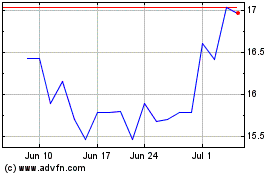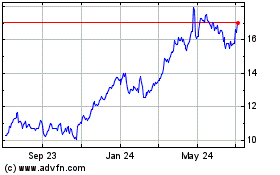By Max Colchester, David Enrich and Simon Clark
LONDON--In March 2006, executives at UniCredit SpA hosted
analysts and investors in Milan's 198-year-old stock exchange
building, bedecked with marble columns and chiseled nude statues,
to declare the onset of a triumphant new era for Europe's
banks.
"We are the first truly European bank," crowed UniCredit's Chief
Executive, Alessandro Profumo, who had just purchased a large
German lender.
Almost exactly a decade later, being a truly European bank is no
longer cause for boasting. After years of lackluster results,
financial scandals, painful share sales, disruptive management
changes, onerous regulations and strategic U-turns, many investors
are throwing in the towel on the once-promising industry.
This year alone, European bank stocks have plunged 18%, compared
with the broader market's 10% tumble, notwithstanding a slight
rebound in recent days. Investor valuations of European banks,
including UniCredit, Deutsche Bank AG and Credit Suisse Group AG,
are plumbing depths they last saw during the 2008 financial crisis
and the 2012 eurozone sovereign-debt meltdown.
"The selloff is totally indiscriminate," said a European
official whose government bailed out its banks and is now stuck
with money-losing stakes in the lenders.
While few experts think Europe's banks are skidding back into an
acute, existential crisis, the chronic problems they face could be
similarly painful to overcome.
The challenges are plentiful. European banks moved slowly to
thicken their capital cushions, especially compared with their U.S.
counterparts. Banks eventually raised more than $400 billion of new
equity since 2007, but many investors want more, especially at
banks with big U.S. presences. The Federal Reserve has been forcing
foreign lenders to keep capital locked in the country.
"It is possible that we will see another number" of
capital-raising share sales, said Filippo Alloatti, a senior
analyst at Hermes Credit. "Doing that now it will be pretty
painful," given the beaten-down level of most European banks'
shares.
European banks are racing to redefine their business models by
abandoning some of their prior ambitions. Barclays PLC is exiting
large swaths of what had been a global empire. The Swiss banks are
retreating from big parts of investment banking. Deutsche Bank is
pulling back on retail banking but faces tough questions about
whether its giant investment bank can consistently make money.
Almost all banks are slashing thousands of jobs.
The increasing likelihood of a global economic slowdown will
make it harder for banks to earn money through their
bread-and-butter lending business and will translate into mounting
losses on loans to individuals and institutions, especially those
in hard-hit emerging market. Central banks' efforts to stimulate
economies by relentlessly slashing interest rates are devastating
to most banks' business models. And rock-bottom oil prices are
keeping a tight lid on inflation, meaning interest rates are
unlikely to rise soon.
That will complicate an already onerous cleanup process, with
roughly EUR1 trillion ($1.12 trillion) of bad loans still festering
on European banks' books from the last crisis, according to the
European Banking Authority.
The situation is particularly acute in Italy, where the
government recently concluded months of negotiations with European
authorities over how it can help lenders shed unwanted loans.
Uncertainty over that process has been punishing for Italian bank
stocks.
Not all of the problems are peculiar to Europe's lenders. All
investment banks, including those on Wall Street, are struggling
with tough trading conditions. But the environment has tipped
European banks into the red, weighed down by billions of dollars in
costs associated with restructuring and resolving government
investigations and lawsuits. Credit Suisse was the most recent
loser, and its shares tanked 11% on Thursday--to their lowest level
in 24 years--after it disclosed that rich clients had yanked cash
from its wealth-management business.
Even the recent plunge in oil prices appears to be taking a toll
on the shares of European banks. Sovereign-wealth funds and other
government-affiliated investors in the Middle East, Africa and
Norway have been among the biggest losers from swooning oil prices,
causing some to sell assets to drum up money. Those same funds
happen to be among the biggest investors in European banks.
About 10% of UniCredit's shares, for example, are held by funds
from Abu Dhabi, Libya and Norway, while Barclays PLC and Credit
Suisse are both roughly 10%-owned by Norwegian and Qatari funds and
investors, according to FactSet. Sovereign funds from oil-producing
nations also own substantial stakes in Deutsche Bank, Italy's
Intesa Sanpaolo SpA, France's BNP Paribas SA and Société Générale
SA, the U.K.'s Lloyds Banking Group PLC and Nordic lender Nordea
Bank AB.
It is unclear if the government funds are actually selling their
European-bank shares--the funds declined to comment--but the
expectation that they are selling or might do so in the future
appears to be exerting downward pressure on the banks' shares.
"Sovereign-wealth funds are definitely a contributor of the
flows that are going out of the sector," said Mark Holman, chief
executive of TwentyFour Asset Management, a London fixed-income
fund manager.
UniCredit, meanwhile, which a decade ago had high hopes for the
new era of European banking, is now among those beating a retreat.
Late last year it presented plans to cut 18,200 jobs and sell its
Ukrainian business. "This plan aims at dispelling any remaining
doubt on capital," said Chief Executive Federico Ghizzoni.
The plan hasn't stabilized UniCredit's shares, which are down
36% this year and are off 90% in the decade since the bank's March
2006 event at the Milan stock exchange.
"We need a circuit breaker," said Hermes Credit's Mr. Alloatti.
"But I don't know what that circuit breaker is."
Write to Max Colchester at max.colchester@wsj.com, David Enrich
at david.enrich@wsj.com and Simon Clark at simon.clark@wsj.com
(END) Dow Jones Newswires
February 05, 2016 08:27 ET (13:27 GMT)
Copyright (c) 2016 Dow Jones & Company, Inc.
Deutsche Bank Aktiengese... (NYSE:DB)
Historical Stock Chart
From Mar 2024 to Apr 2024

Deutsche Bank Aktiengese... (NYSE:DB)
Historical Stock Chart
From Apr 2023 to Apr 2024
